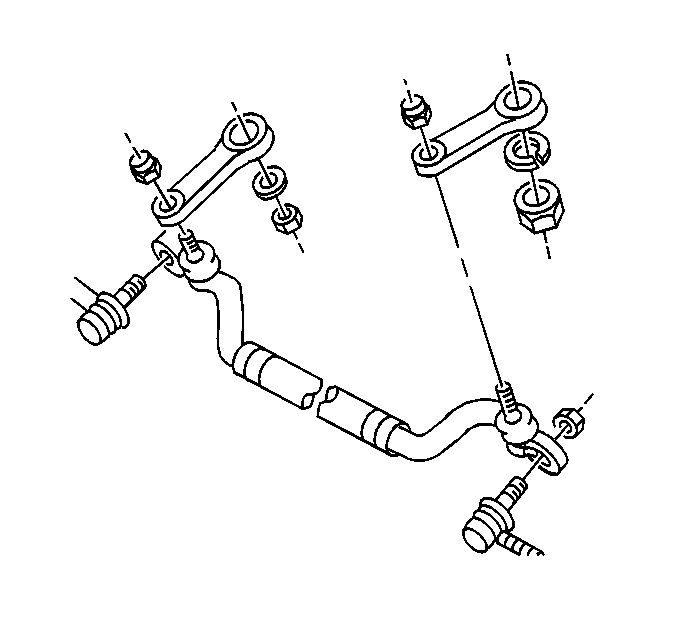Removal Procedure
Tools Required
| • | J 6627-A Tie Rod / Wheel Stud Puller |
| • | J 42089 Linkage Installer |
| • | J 42400 Relay Rod Removal Tool |
Notice: Do not attempt to disconnect a steering linkage joint by driving a wedge between the joint and the attached part. Seal damage may result which will cause premature failure of the joint.
- Raise and support the vehicle. Refer to Lifting and Jacking the Vehicle in General Information.
- Remove the inner tie rod ball stud nuts.
- Use the J 6627-A to remove the inner tie rods from the relay rod.
- Remove the relay rod ball stud nut from the pitman arm.
- Use the J 42400 to remove the relay rod ball stud from the pitman arm.
- Remove the relay rod ball stud nut from the idler arm.
- Use the J 42400 to remove the relay rod ball stud from the idler arm.
Caution: To help avoid personal injury when a vehicle is on a hoist, provide additional support for the vehicle at the opposite end from which components are being removed. This will reduce the possibility of the vehicle falling off the hoist.

Installation Procedure
- Install the relay rod to the idler arm.
- Install the J 42089 to the relay rod ball stud.
- Remove the J 42089 from the relay rod ball stud.
- Install the relay rod ball stud-to-idler arm nut.
- Install the relay rod to the pitman arm.
- Install the J 42089 to the relay rod ball stud.
- Remove the J 42089 from the relay rod ball stud.
- Install the relay ball stud-to-pitman arm nut.
- Install the inner tie rods into the relay rod.
- Install the J 42089 to tie rod ball stud.
- Remove the J 42089 from the tie rod ball stud.
- Install a new self-locking tie rod ball stud nut.
- Lower the vehicle.
- Adjust the toe to the proper specification. Refer to Wheel Alignment Measurement in Wheel Alignment.

Notice: Use the correct fastener in the correct location. Replacement fasteners must be the correct part number for that application. Fasteners requiring replacement or fasteners requiring the use of thread locking compound or sealant are identified in the service procedure. Do not use paints, lubricants, or corrosion inhibitors on fasteners or fastener joint surfaces unless specified. These coatings affect fastener torque and joint clamping force and may damage the fastener. Use the correct tightening sequence and specifications when installing fasteners in order to avoid damage to parts and systems.
Tighten
Tighten the J 42089
to
30 N·m (22 lb ft) to allow the ball stud taper
to seat.
Important: Use a new self-locking relay rod ball stud nut.
Tighten
Tighten the relay rod ball stud-to-idler arm nut to 60 N·m
(44 lb ft).
Tighten
Tighten the J 42089
to
30 N·m (22 lb ft) to allow the ball stud taper
to seat.
Important: Use a new self-locking relay rod ball stud nut.
Tighten
Tighten the relay rod ball stud-to-pitman arm nut to 60 N·m
(44 lb ft).
Tighten
Tighten the J 42089
to
30 N·m (22 lb ft) to allow the tie rod ball stud
taper to seat.
Tighten
Tighten the ball stud nut to 60 N·m (44 lb ft).
